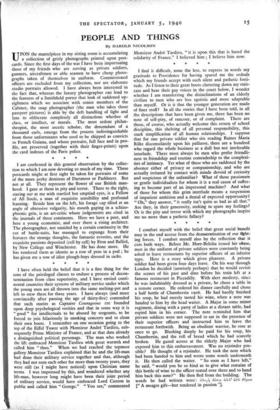I find it difficult, none the less, to express in
words my gratitude to Providence for having spared me the ordeals which my friends accept with such silent and pathetic forti- tude. As I listen to their great boots clattering down my stair- case and hear their gay voices in the court below, I wonder whether I am transferring the disinclinations of an elderly civilian to men who are less egoistic and more adaptable than myself. Or is it that the younger generation are made of finer stuff? In all the stories that I have been told, in all the descriptions that have been given me, there has been no note of self-pity, of rancour, or of complaint. There are those, of course, who actually welcome this return of school discipline, this shelving of all personal responsibility, this stark simplification of all human relationships. I suppose that for one private soldier who sits reading Rainer Maria Rilke disconsolately upon his palliasse, there are a hundred who regard the whole business as a dull but not intolerable interlude. There must always be men who prefer friendli- ness to friendship and routine comradeship to the complexi- ties of intimacy. Yet what of those who are saddened by the absence either of privacy or companionship, and who are actually irritated by contact with minds devoid of curiosity and suspicious of the unfamiliar? What of those passionate or gentle individualists for whom it is a real cause of suffer- ing to become part of an impersonal machine? And what of those for whom this grim interlude means a suspension of impatient ambition and a denial of expected opportunity? " Oh," they answer, " it really isn't quite as bad as all that." Are they, in their generosity, seeking to spare my feelings? Or is the pity and terror with which my photographs inspire me no more than a pathetic fallacy?
* * * *


































 Previous page
Previous page